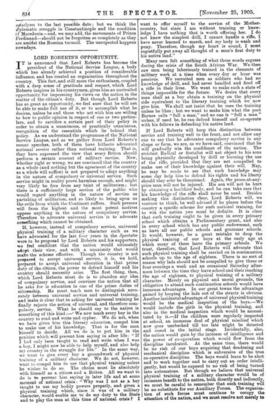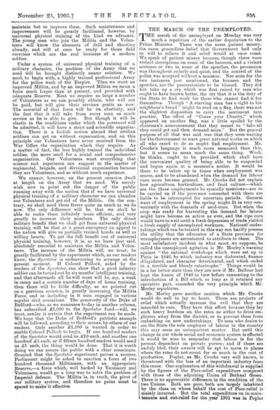If Lord Roberts will keep this distinction between service and
training well to the front, and not allow any one to say that he advocates compulsory service in any shape or form, we are, as we have said, convinced that he will gradually win the confidence of the nation. The strictest Radical or Socialist will not object to his sons being physically developed by drill or learning the use of the rifle, provided that they are not compelled to make use of their knowledge against their will. Nay, he may be made to see that such knowledge may some day help him to defend his rights and his liberty should they ever be threatened. Again, the peace-at-any- price man will not be injured. His son will not be hurt by obtaining a healthier body, and he can take care that his knowledge of the rifle shall never be used. Besides making this distinction clear, Lord Roberts will, we venture to think, be well advised if he places before the country a specific scheme for such national training, for to win the nation you must be definite. It is clear that such training ought to be given in every primary school which obtains a Parliamentary grant, and also in every school which has any public endowment, such as have all our public schools and grammar schools. It would, however, be a great mistake to drop the physical training of our boys at the early age at which many of them leave the primary schools. We trust, therefore, that Lord Roberts will advocate that such physical training shall be carried on in continuation schools up to the age of eighteen. There is no sort of reason why lads should not be compelled to give three or four evenings a week and an occasional Saturday after- noon between the time they leave school and their reaching the age of eighteen, to physical training of a military character. Merely on physical and moral grounds, the obligation to attend such continuation schools would have immense advantages. In our great towns the advantage gained by keeping the lads out of the streets is obvious. Another incidental advantage of universal physical training would be the medical inspection of the boys.—We would include the girls in the physical training, and. also in the medical inspection which would be necessi- tated by it.—If the children were regularly inspected. at school, an immense deal of physical mischief which now goes unchecked till too late might be detected and cured in the initial stage. Incidentally, also, the nation would gain by the increase of intelligence and the power of co-operation which would flow from the discipline inculcated. At the same time, there would be no risk of our boys acquiring that deadening and mechanical discipline which is subversive of the true co-operative discipline. The boys would learn to be alert and. to work together and to carry out an order intelli- gently, but would be exposed to no risk of being turned into automatons. But though we believe that universal physical training of a military character would be of immense benefit to the nation, both directly and indirectly, we must be careful to remember that such training will be no substitute for our Auxiliary Forces. The organisa- tion of such forces must continue to occupy the attention of the nation, and we must resolve not merely to maintain but to improve them. Such maintenance and improvement will be greatly facilitated, however, by universal physical training of the kind we advocate. The young men who join the Militia and the Volun- teers will know the elements of drill and shooting already, and will at once be ready for those field exercises which are the real business of a modern soldier.
Under a system of universal physical training of a military character, the problem of the Army that we need will be brought distinctly nearer solution. We need, to begin with, a highly trained professional Army for the police work of the Empire. Then we want an improved Militia, and by an improved Militia we mean a force much larger than at present, and provided with adequate Reserve. Next we require as large a number of Volunteers as we can possibly obtain, who will not be paid, but will give their services gratis as now. The essential of that force will be its elasticity, and the fact that it will take from every man as much service as he is able to give. But though it will be elastic in the conditions under which the personnel will be admitted, it will have a strict and scientific organisa- tion. There is a foolish notion abroad that civilian soldiers can get on without organisation, and on this principle our Volunteers have never received from the War Office the organisation which they require. As a matter of fact, the less highly trained the individual soldier, the more need for a sound and comprehensive organisation. Our Volunteers want everything that science and experience can suggest in the matter of regimental, brigade, and divisional organisation because they are Volunteers, and so without much experience.





















































 Previous page
Previous page